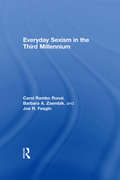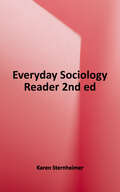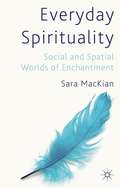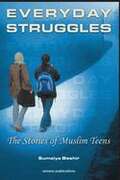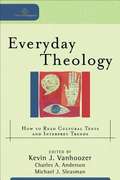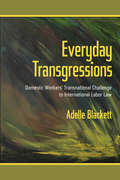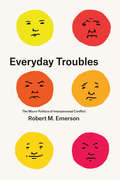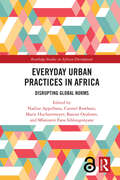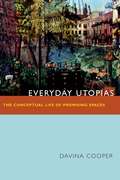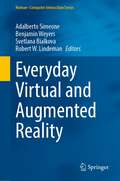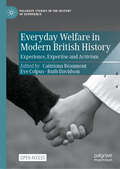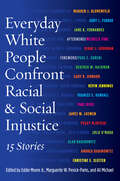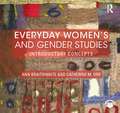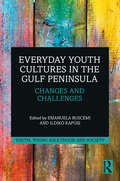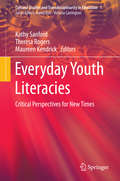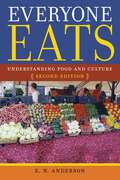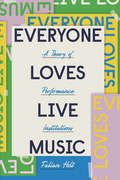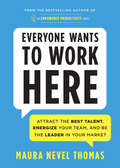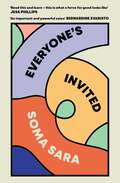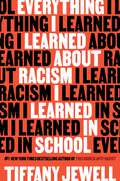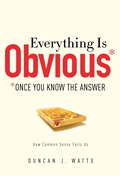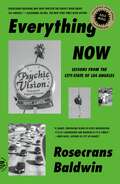- Table View
- List View
Everyday Sexism in the Third Millennium
by Joe R. Feagin Carol Rambo Ronai Barbara A. ZsembikThis collection features new and original research on the range of sexism still faced every day by women in US society. It documents oppression across ethnic, racial, class, and sexual orientation groups in a wide range of gendered spaces, including the home, the workplace, unions, educational institutions, and the Internet. Exploring the way these different but related systems of oppression interact, the editors come to view sexism not as a static thing, but as part of a "dialectic of domination" in which women are simultaneously oppressed and capable of oppressing others through their discourse and practice. With its broad range of approaches, its focus on discourse and experience in gendered spaces, and its debunking of the personal and societal fictions of gender, this book goes a long way toward explaining why sexism is still so pervasive in everyday life.
Everyday Silence and the Holocaust
by Irene LevinEveryday Silence and the Holocaust examines Irene Levin’s experiences of her family’s unspoken history of the Holocaust and the silence that surrounded their war experiences as non-topics.A central example of what C. Wright Mills considered the core of sociology – the intersection of biography and history – the book covers the process by which the author came to understand that notes found in her mother’s apartment following her death were not unimportant scribbles, but in fact contained elements of her mother’s biographical narrative, recording her parents’ escape from occupied Norway to unoccupied Sweden in late 1942. From the mid-1990s, when society began to open up about the atrocities committed against the Jews, so too did the author find that her mother and the wider Jewish population ceased to be silent about their war experiences and began to talk. Charting the process by which the author traced the family’s broader history, this book explores the use of silence, whether in the family or in society more widely, as a powerful analytic tool and examines how these silences can intertwine. This book provides insight into social processes often viewed through a macro-historical lens by way of analysis of the life of an "ordinary" Jewish woman as a survivor.An engaging, grounded study of the biographical method in sociology and the role played by silence, this book will appeal to readers with an interest in the Holocaust and World War II, as well as in social scientific research methods. It will be of use to both undergraduate and postgraduate scholars in the fields of history, social science, psychology, philosophy, and the history of ideas.The Open Access version of this book, available at http://www.taylorfrancis.com, has been made available under a Creative Commons [Attribution-Non Commercial-No Derivatives (CC-BY-NC-ND)] 4.0 license.
Everyday Sociology Reader
by Karen SternheimerThis book combines classic and contemporary readings by sociologists with posts from the Everyday Sociology blog to help students make connections between major sociological concepts, popular culture, current events, and everyday life. A wealth of suggested activities, exercises, discussion questions, and essay topics gets students actively engaging in sociological thinking, writing, and research.
Everyday Spirituality
by Sara MackianThis book puts spirit back at the heart of spirituality. By exploring the everyday impacts of alternative spiritual beliefs and practices, the book examines contemporary spirituality and how critical social science can map and understand it.
Everyday Struggles: The Stories of Muslim Teens
by Sumaiya BeshirThis is a collection of stories of Muslim teens and their peers.
Everyday Theology: How to Read Cultural Texts and Interpret Trends (Cultural Exegesis)
by Kevin J. Vanhoozer Michael J. Sleasman Charles A. AndersonEveryday theology is the reflective and practical task of living each day as faithful disciples of Jesus Christ. In other words, theology is not just for Sundays, and it's not just for professional theologians. Everyday Theology teaches all Christians how to get the theological lay of the land. It enables them to become more conscious of the culture they inhabit every day so that they can understand how it affects them and how they can affect it. If theology is the ministry of the Word to the world, everyday theologians need to know something about that world, and Everyday Theology shows them how to understand their culture make an impact on it. Engaging and full of fresh young voices, this book is the first in the new Cultural Exegesis series.
Everyday Transgressions: Domestic Workers' Transnational Challenge to International Labor Law
by Adelle BlackettAdelle Blackett tells the story behind the International Labour Organization's (ILO) Decent Work for Domestic Workers Convention No. 189, and its accompanying Recommendation No. 201 which in 2011 created the first comprehensive international standards to extend fundamental protections and rights to the millions of domestic workers laboring in other peoples' homes throughout the world. As the principal legal architect, Blackett is able to take us behind the scenes to show us how Convention No. 189 transgresses the everyday law of the household workplace to embrace domestic workers' human rights claim to be both workers like any other, and workers like no other. In doing so, she discusses the importance of understanding historical forms of invisibility, recognizes the influence of the domestic workers themselves, and weaves in poignant experiences, infusing the discussion of laws and standards with intimate examples and sophisticated analyses. Looking to the future, she ponders how international institutions such as the ILO will address labor market informality alongside national and regional law reform. Regardless of what comes next, Everyday Transgressions establishes that domestic workers' victory is a victory for the ILO and for all those who struggle for an inclusive, transnational vision of labor law, rooted in social justice.
Everyday Troubles: The Micro-Politics of Interpersonal Conflict
by Robert M. EmersonFrom roommate disputes to family arguments, trouble is inevitable in interpersonal relationships. In Everyday Troubles, Robert M. Emerson explores the beginnings and development of the conflicts that occur in our relationships with the people we regularly encounter—family members, intimate partners, coworkers, and others—and the common responses to such troubles. To examine these issues, Emerson draws on interviews with college roommates, diaries documenting a wide range of irritation with others, conversations with people caring for family members suffering from Alzheimer’s, studies of family interactions, neighborly disputes, and other personal accounts. He considers how people respond to everyday troubles: in non-confrontational fashion, by making low-visibility, often secretive, changes in the relationship; more openly by directly complaining to the other person; or by involving a third party, such as friends or family. He then examines how some relational troubles escalate toward extreme and even violent responses, in some cases leading to the involvement of outside authorities like the police or mental health specialists. By calling attention to the range of possible reactions to conflicts in interpersonal relationships, Emerson also reminds us that extreme, even criminal actions often result when people fail to find ways to deal with trouble in moderate, non-confrontational ways. Innovative and insightful, Everyday Troubles is an illuminating look at how we deal with discord in our relationships.
Everyday Urban Practices in Africa: Disrupting Global Norms (Routledge Studies in African Development)
by Nadine Appelhans Basirat Oyalowo Carmel Rawhani Marie Huchzermeyer Mfaniseni Fana SihlongonyaneThis book disrupts the dominant underlying international norms informing urban development strategies across African cities. International policy frameworks have created a new universal agenda for developing cities. However, these frameworks have also imposed global paradigms and discourses that are often in conflict with local urbanisms. As we approach the deadline for achieving the Sustainable Development Goals, there is need for reflection and deliberation on a post-2030 agenda.The authors identify powerful assumptions, norms, and positionalities that obfuscate the efforts to achieve sustainable development in African cities, as well as along the North–South divide. They argue that a disruptive critique of these normative concepts, grounded in the lived African urban everyday, opens up opportunities to dismantle their assumed neutrality. Through disruption, the authors critically re-interpret the meanings of policy and the praxis of local urbanism, ultimately challenging the logic of universalising concepts underpinning implementation in the current international policy system, and asserting the need for contextualised urban policies.The book will be of interest to scholars and students of urban studies, development planning, urban governance, human settlements, development studies, urban geography, and African studies. It will also be useful for practitioners including town and regional/urban planners, urban policy consultants, and international development cooperation agencies.The Open Access version of this book, available at http://www.taylorfrancis.com, has been made available under a Creative Commons Attribution-Non Commercial-No Derivatives (CC-BY-NC-ND) 4.0 license.
Everyday Utopias: The Conceptual Life of Promising Spaces
by Davina CooperEveryday utopias enact conventional activities in unusual ways. Instead of dreaming about a better world, participants seek to create it. As such, their activities provide vibrant and stimulating contexts for considering the terms of social life, of how we live together and are governed. Weaving conceptual theorizing together with social analysis, Davina Cooper examines utopian projects as seemingly diverse as a feminist bathhouse, state equality initiatives, community trading networks, and a democratic school where students and staff collaborate in governing. She draws from firsthand observations and interviews with participants to argue that utopian projects have the potential to revitalize progressive politics through the ways their innovative practices incite us to rethink mainstream concepts including property, markets, care, touch, and equality. This is no straightforward story of success, however, but instead a tale of the challenges concepts face as they move between being imagined, actualized, hoped for, and struggled over. As dreaming drives new practices and practices drive new dreams, everyday utopias reveal how hard work, feeling, ethical dilemmas, and sometimes, failure, bring concepts to life.
Everyday Virtual and Augmented Reality (Human–Computer Interaction Series)
by Benjamin Weyers Adalberto Simeone Svetlana Bialkova Robert W. LindemanThis edited book introduces readers to the area of “Everyday Virtual and Augmented Reality”. With Virtual and Augmented Reality technologies, becoming more pervasive in our homes and workplaces, new use cases and scenarios emerge together with new challenges that need to be addressed. These challenges encompass the design and implementation of appropriate VR/AR applications for ordinary environments that were not built with the explicit intention of supporting VR systems. The everyday/domestic environments present a range of issues that are usually not present in the physical locations purposed for VR and AR use in academic or professional environments, such as constrained spaces, presence of obstacles, absence of instrumentation, social and organizational restrictions etc. To address the above challenges, we collect the latest work from the Virtual Reality and Augmented Reality research community, by combining the presentation of general definitions and characterization of the field, of interaction concepts and techniques, of a variety of use cases and areas. The constellation of different environment examples (from education, sport to consumer and marketing), from across the globe and platforms, provide a comprehensive discussion on scientific and engineering methods, which enable the development of VR/AR systems in everyday context.
Everyday Welfare in Modern British History: Experience, Expertise and Activism (Palgrave Studies in the History of Experience)
by Eve Colpus Ruth Davidson Caitríona BeaumontThis open access book offers a new approach to understandings of welfare in modern Britain. Foregrounding the agency individuals and groups claimed through experiential expertise, it traces deep connections between personal experience, welfare, and activism across diverse settings in modern Britain. The experiential experts studied in this collection include women, students, children, women who have sex with women, bereaved families, community groups, individuals living in poverty, adults whose status sits outside professional categories, health service users, and people of faith. Chapters trace how these groups have used their experiences to assert an expert witness status and have sought out new spaces to expand the scope, inclusivity, and applicability of welfare services.
Everyday White People Confront Racial and Social Injustice: 15 Stories
by Marguerite W. Penick-Parks Ali Michael Eddie MooreWhile we are all familiar with the lives of prominent Black civil rights leaders, few of us have a sense of what is entailed in developing a White anti-racist identity. Few of us can name the White activists who joined the struggle against discrimination, let alone understand the complexities, stresses and contradictions of doing this work while benefiting from the privileges they enjoyed as Whites. This book fills that gap by vividly presenting – in their own words – the personal stories, experiences and reflections of fifteen prominent White anti-racists. They recount the circumstances that led them to undertake this work, describe key moments and insights along their journeys, and frankly admit their continuing lapses and mistakes. They make it clear that confronting oppression (including their own prejudices) – whether about race, sexual orientation, ability or other differences – is a lifelong process of learning. The chapters in this book are full of inspirational and lesson-rich stories about the expanding awareness of White social justice advocates and activists who grappled with their White privilege and their early socialization and decided to work against structural injustice and personal prejudice. The authors are also self-critical, questioning their motivations and commitments, and acknowledging that – as Whites and possessors of other privileged identities – they continue to benefit from White privilege even as they work against it.This is an eye-opening book for anyone who wants to understand what it means to be White and the reality of what is involved in becoming a White anti-racist and social justice advocate; is interested in the paths taken by those who have gone before; and wants to engage reflectively and critically in this difficult and important work.Contributing AuthorsWarren J. BlumenfeldAbby L. FerberJane K. FernandesMichelle FineDiane J. GoodmanPaul C. GorskiHeather W. HackmanGary R. HowardKevin JenningsFrances E. KendallPaul KivelJames W. LoewenPeggy McIntoshJulie O’MaraAlan RabinowitzAndrea RabinowitzChristine E. Sleeter
Everyday Women's and Gender Studies: Introductory Concepts
by Ann Braithwaite Catherine M. OrrEveryday Women’s and Gender Studies is a text-reader that offers instructors a new way to approach an introductory course on women’s and gender studies. This book highlights major concepts that organize the diverse work in this field: Knowledges, Identities, Equalities, Bodies, Places, and Representations. Its focus on "the everyday" speaks to the importance this book places on students understanding the taken-for granted circumstances of their daily lives. Precisely because it is not the same for everyone, the everyday becomes the ideal location for cultivating students’ intellectual capacities as well as their political investigations and interventions. In addition to exploring each concept in detail, each chapter includes up to five short recently published readings that illuminate an aspect of that concept. Everyday Women’s and Gender Studies explores the idea that "People are different, and the world isn’t fair," and engages students in the inevitably complicated follow-up question, "Now that we know, how shall we live?"
Everyday Youth Cultures in the Gulf Peninsula: Changes and Challenges (Youth, Young Adulthood and Society)
by Emanuela BuscemiFocusing on the struggles of youth in the Arabian Gulf to find their place in their encounters with modernity, Everyday Youth Cultures in the Gulf Peninsula explores how global forces are reshaping everyday cultural experiences in authoritarian societies. A deeper understanding of Gulf youth emerges from reading about the everyday lives and struggles, opportunities, and contributions of youth who, in the process of developing their personal identities, are also incrementally transforming their societies and cultures. Based on ethnographic fieldwork in Kuwait, Oman, Saudi Arabia, the UAE, and Qatar, the chapters bring fresh insight into Gulf youth microcultures from the ground and invite dialogue by engaging young local and foreign academics in the discussion. In light of the general difficulties of accessing Gulf societies, the book’s nuanced, richly detailed depictions of everyday life can be of interest to academic research in Middle East studies, youth sociology, political science and anthropology, as well as to business and governmental decision-making.
Everyday Youth Literacies
by Kathy Sanford Theresa Rogers Maureen KendrickTestifying to the maturity of the youth literacy education field, this collection of papers displays the increasing sophistication of research on the subject, and at the same time offers pointers to its potential for development in the next decade. The contributors track the rapid proliferation of youth literacies in today's digital age, from video games to social media and film production. Drawing on detailed research and an intimate knowledge of youth communities in nations as diverse as Canada and Uganda, they provide notable examples of digital literacies in situ, and challenge conventional wisdom about literacy education. The chapters do more, however, than merely offer reportage of a crisis in literacy education. The authors embrace the core challenge faced by educators everywhere: how to incorporate and utilize new modes of literacy in education, and how to realize the potential benefits of heterogeneous modern media in youth literacy education, especially in marginalized, remote, and disadvantaged communities. This volume expands our view of digital communications technologies and digital literacies to include complex understandings of how media such as translated videos can serve as learning tools for youths whose access to literacy education is limited. In particular, a number of contributing scholars provide important new information about the praxis of teachers and the literacies adopted by young people in Africa, a continent largely neglected by literacy researchers. This book's global perspective, and its ground-level viewpoint of youth literacy practices in a variety of locations, problematizes normative assumptions about researching literacy as well as about literacy itself.
Everyone Eats: Understanding Food and Culture
by E. N. AndersonAn illuminating anthropological study of the ways that cultures and political systems structure the edible environment. Everyone eats, but rarely do we investigate why we eat what we eat. Why do we love spices, sweets, coffee? How did rice become such a staple food throughout so much of eastern Asia? Everyone Eats examines the social and cultural reasons for our food choices and provides an explanation of the nutritional reasons for why humans eat what they do, resulting in a unique cultural and biological approach to the topic. E. N. Anderson explains the economics of food in the globalization era; food&’s relationship to religion, medicine, and ethnicity; and offers suggestions on how to end hunger, starvation, and malnutrition. This thoroughly updated Second Edition incorporates the latest food scholarship, most notably recognizing the impact of sustainable eating advocacy and the state of food security in the world today. Anderson also brings more insight than ever before into the historical and scientific underpinnings of our food customs, fleshing this out with fifteen new and original photographs from his own extensive fieldwork. A perennial classic in the anthropology of food, Everyone Eats feeds our need to understand human ecology by explaining the ways that cultures and political systems structure the edible environment.
Everyone Loves Live Music: A Theory of Performance Institutions (Big Issues in Music)
by Fabian HoltFor decades, millions of music fans have gathered every summer in parks and fields to hear their favorite bands at festivals such as Lollapalooza, Coachella, and Glastonbury. How did these and countless other festivals across the globe evolve into glamorous pop culture events, and how are they changing our relationship to music, leisure, and public culture? In Everyone Loves Live Music, Fabian Holt looks beyond the marketing hype to show how festivals and other institutions of musical performance have evolved in recent decades, as sites that were once meaningful sources of community and culture are increasingly subsumed by corporate giants. Examining a diverse range of cases across Europe and the United States, Holt upends commonly-held ideas of live music and introduces a pioneering theory of performance institutions. He explores the fascinating history of the club and the festival in San Francisco and New York, as well as a number of European cities. This book also explores the social forces shaping live music as small, independent venues become corporatized and as festivals transform to promote mainstream Anglophone culture and its consumerist trappings. The book further provides insight into the broader relationship between culture and community in the twenty-first century. An engaging read for fans, industry professionals, and scholars alike, Everyone Loves Live Music reveals how our contemporary enthusiasm for live music is more fraught than we would like to think.
Everyone Loves Live Music: A Theory of Performance Institutions (Big Issues in Music)
by Fabian HoltFor decades, millions of music fans have gathered every summer in parks and fields to hear their favorite bands at festivals such as Lollapalooza, Coachella, and Glastonbury. How did these and countless other festivals across the globe evolve into glamorous pop culture events, and how are they changing our relationship to music, leisure, and public culture? In Everyone Loves Live Music, Fabian Holt looks beyond the marketing hype to show how festivals and other institutions of musical performance have evolved in recent decades, as sites that were once meaningful sources of community and culture are increasingly subsumed by corporate giants. Examining a diverse range of cases across Europe and the United States, Holt upends commonly-held ideas of live music and introduces a pioneering theory of performance institutions. He explores the fascinating history of the club and the festival in San Francisco and New York, as well as a number of European cities. This book also explores the social forces shaping live music as small, independent venues become corporatized and as festivals transform to promote mainstream Anglophone culture and its consumerist trappings. The book further provides insight into the broader relationship between culture and community in the twenty-first century. An engaging read for fans, industry professionals, and scholars alike, Everyone Loves Live Music reveals how our contemporary enthusiasm for live music is more fraught than we would like to think.
Everyone Loves Live Music: A Theory of Performance Institutions (Big Issues in Music)
by Fabian HoltFor decades, millions of music fans have gathered every summer in parks and fields to hear their favorite bands at festivals such as Lollapalooza, Coachella, and Glastonbury. How did these and countless other festivals across the globe evolve into glamorous pop culture events, and how are they changing our relationship to music, leisure, and public culture? In Everyone Loves Live Music, Fabian Holt looks beyond the marketing hype to show how festivals and other institutions of musical performance have evolved in recent decades, as sites that were once meaningful sources of community and culture are increasingly subsumed by corporate giants. Examining a diverse range of cases across Europe and the United States, Holt upends commonly-held ideas of live music and introduces a pioneering theory of performance institutions. He explores the fascinating history of the club and the festival in San Francisco and New York, as well as a number of European cities. This book also explores the social forces shaping live music as small, independent venues become corporatized and as festivals transform to promote mainstream Anglophone culture and its consumerist trappings. The book further provides insight into the broader relationship between culture and community in the twenty-first century. An engaging read for fans, industry professionals, and scholars alike, Everyone Loves Live Music reveals how our contemporary enthusiasm for live music is more fraught than we would like to think.
Everyone Wants to Work Here: Attract the Best Talent, Energize Your Team, and Be the Leader in Your Market (Empowered Productivity)
by Maura ThomasBe the leader your team wants to followYou want to be the kind of leader that leaves a legacy of positive impact. You want to lead an exceptional team so you can power your organization's success and unleash the hidden potential in every team member – including yourself! So how do you realize these goals?In this expansive guide, expert Maura Thomas explores how to combat insidious problems that are costing your organization millions. You can change the status quo with her step-by-step guidance to energize your team, and provide greater focus, transparency, and accountability in the organization. Leaders and aspiring leaders like you will discover how to not only extinguish—but prevent—the dozens of "fires" that pop up all day. You can transform a stressful culture into an empowering one, or a great culture into one where top talent is lining up to be a part of your team. Imagine having consistently productive and satisfying work days, and contributing even more to the organization—but in a way that's inspiring and motivating instead of overwhelming and depleting.The techniques in this book will not only help you, your team and your organization, they'll boost your ability to contribute in a positive way to families, your community, and the world.
Everyone's Invited
by Soma Sara'Read this and learn – this is what a force for good looks like' Jess Phillips MP 'Her work has directly contributed to a groundswell of pent-up frustration and exhaustion from women and girls who have simply had enough. And people are listening.&’ The Independent &‘Soma&’s efforts feel more pressing than ever&’ VogueWe are all a part of a culture that is broken – and nobody benefits from it. It&’s in the news we read, the films we watch, the music we listen to, the people we surround ourselves with, the institutions we navigate, the laws we follow, and the streets we walk. We are part of a system that was founded on inequality and drastic power imbalance. Of course, many things are better than they were. But the age of social media has dramatically exposed truths previously hidden. In this collection of essays, covering subjects from porn to the patriarchy, Soma Sara draws a line between the different facets of our society that enable inequality to flourish. The scale of the problem is vast, and deeply entrenched in all of us. Here, Soma Sara argues that we can flip the script and start solving the problem – and create a better society for everyone.Everyone&’s Invited is an essential and enlightening force to push us forward to a more equal world.
Everything I Learned About Racism I Learned in School
by Tiffany JewellFrom the #1 New York Times bestselling author of This Book Is Anti-Racist and The Antiracist Kid, Tiffany Jewell, this YA nonfiction book, highlighting inequities Black and Brown students face from preschool through college, is the most important, empowering read this year.From preschool to higher education and everything in between, Everything I Learned About Racism I Learned in School focuses on the experiences Black and Brown students face as a direct result of the racism built into schools across the United States.The overarching nonfiction narrative follows author Tiffany Jewell from early elementary school through her time at college, unpacking the history of systemic racism in the American educational system along the way. Throughout the book, other writers of the global majority share a wide variety of personal narratives and stories based on their own school experiences.Contributors include New York Times bestseller Joanna Ho; award winners Minh Lê, Randy Ribay, and Torrey Maldonado; authors James Bird and Rebekah Borucki; author-educators Amelia A. Sherwood, Roberto Germán, Liz Kleinrock, Gary R. Gray Jr., Lorena Germán, Patrick Harris II, shea wesley martin, David Ryan Barcega Castro-Harris, Ozy Aloziem, Gayatri Sethi, and Dulce-Marie Flecha; and even a couple of teen writers!Everything I Learned About Racism I Learned in School provides young folks with the context to think critically about and chart their own course through their current schooling—and any future schooling they may pursue.
Everything Is Obvious: *Once You Know the Answer
by Duncan J. WattsWhy is the Mona Lisa the most famous painting in the world? Why did Facebook succeed when other social networking sites failed? Did the surge in Iraq really lead to less violence? How much can CEO’s impact the performance of their companies? And does higher pay incentivize people to work hard?If you think the answers to these questions are a matter of common sense, think again. As sociologist and network science pioneer Duncan Watts explains in this provocative book, the explanations that we give for the outcomes that we observe in life—explanation that seem obvious once we know the answer—are less useful than they seem.Drawing on the latest scientific research, along with a wealth of historical and contemporary examples, Watts shows how common sense reasoning and history conspire to mislead us into believing that we understand more about the world of human behavior than we do; and in turn, why attempts to predict, manage, or manipulate social and economic systems so often go awry.It seems obvious, for example, that people respond to incentives; yet policy makers and managers alike frequently fail to anticipate how people will respond to the incentives they create. Social trends often seem to have been driven by certain influential people; yet marketers have been unable to identify these “influencers” in advance. And although successful products or companies always seem in retrospect to have succeeded because of their unique qualities, predicting the qualities of the next hit product or hot company is notoriously difficult even for experienced professionals.Only by understanding how and when common sense fails, Watts argues, can we improve how we plan for the future, as well as understand the present—an argument that has important implications in politics, business, and marketing, as well as in science and everyday life.
Everything Now: Lessons from the City-State of Los Angeles
by Rosecrans BaldwinA LOS ANGELES TIMES BESTSELLER. NAMED A MOST ANTICIPATED BOOK OF 2021 BY THE MILLIONSA provocative, exhilaratingly new understanding of the United States’ most confounding metropolis—not just a great city, but a full-blown modern city-stateAmerica is obsessed with Los Angeles. And America has been thinking about Los Angeles all wrong, for decades, on repeat. Los Angeles is not just the place where the American dream hits the Pacific. (It has its own dreams.) Not just the vanishing point of America’s western drive. (It has its own compass.) Functionally, aesthetically, mythologically, even technologically, an independent territory, defined less by distinct borders than by an aura of autonomy and a sense of unfurling destiny—this is the city-state of Los Angeles.Deeply reported and researched, provocatively argued, and eloquently written, Rosecrans Baldwin's Everything Now approaches the metropolis from unexpected angles, nimbly interleaving his own voice with a chorus of others, from canonical L.A. literature to everyday citizens. Here, Octavia E. Butler and Joan Didion are in conversation with activists and astronauts, vampires and veterans. Baldwin records the stories of countless Angelenos, discovering people both upended and reborn: by disasters natural and economic, following gospels of wealth or self-help or personal destiny. The result is a story of a kaleidoscopic, vibrant nation unto itself—vastly more than its many, many parts.Baldwin’s concept of the city-state allows us, finally, to grasp a place—Los Angeles—whose idiosyncrasies both magnify those of America, and are so fully its own. Here, space and time don’t quite work the same as they do elsewhere, and contradictions are as stark as southern California’s natural environment. Perhaps no better place exists to watch the United States’s past, and its possible futures, play themselves out. Welcome to Los Angeles, the Great American City-State.
